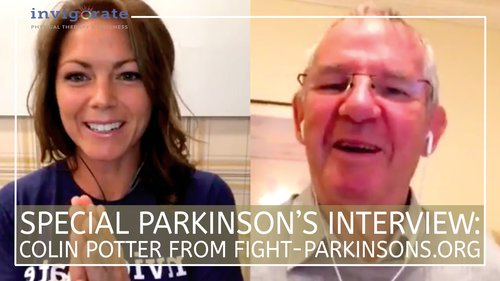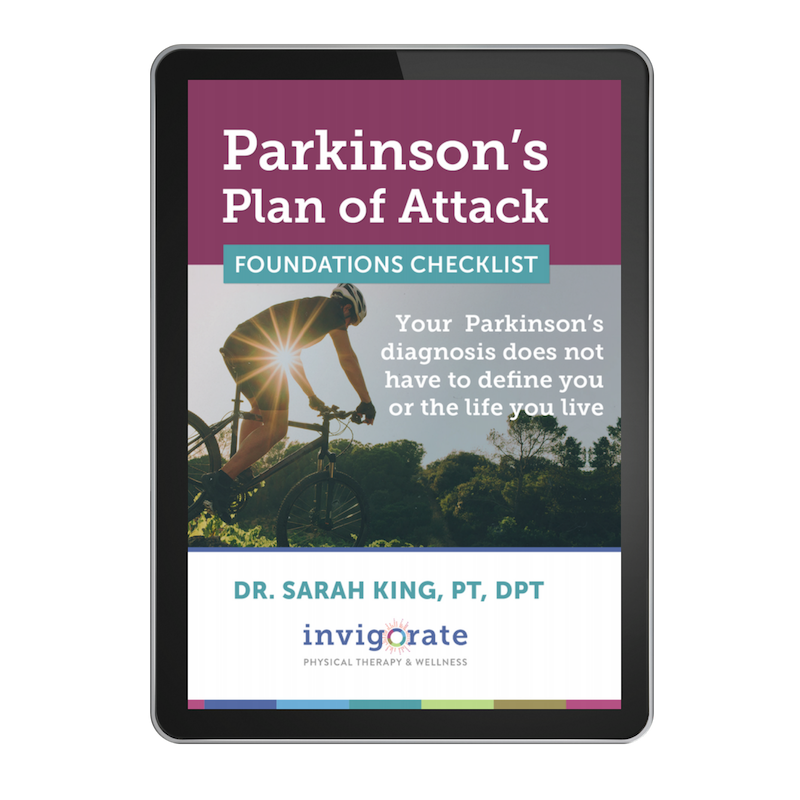FIRST, A DISCLAIMER:
There will be NO doomsday talk here.
I promise.
If you’ve landed on this blog post, it’s very likely you’ve already paid a visit to Dr. Google and the WebMD Wizard.
While well intentioned, those guys can overwhelm very, very quickly. So, I want to let you know that this is a safe space and I promise to avoid any fear mongering or worst-case-scenario prophetising.
A new diagnosis of Parkinson’s can be overwhelming, and I’m here to offer some practical, powerful information you can use to educate and empower yourself on this new, unfamiliar journey.
I know the urge is strong, but please don’t run away.
In my physical therapy practice, I work daily with clients who are downright terrified after their diagnosis. They finally ended up in a neurologist’s office with a few benign symptoms and their doctor’s feedback went something like this:
“It looks like you have Parkinson’s disease, which is a degenerative neurological disease. Take these medications, they’ll help with the symptoms. There is no cure. Come back and see me in a few months.”
… and that’s it.
Talk about traumatic!
They frantically search for answers via the internet and come to me with a list of fears a mile long that - in order to respect my “no doomsday” clause - we’ll leave unnamed for today.
“What can I expect?”, they ask.
“How’s this all going to play out?”
Here’s the truth:
I don't know.
I don't have a crystal ball.
And neither does your physician.. or Dr. Google.. or the WebMD Wizard.
No one knows what's in store for your future, whether you have Parkinson's or not.
You can either look at this as terrifying - as “the enemy you don’t know” - or you can look at this as empowering because, in the end, you still have the power to choose your path forward.
(And, I’m going to help layout how to do just that in today’s post.)
Yes, it's true that Parkinson's is classified as a “degenerative neurological disease”. And no, we do not have a cure for Parkinson's at this time.
However, that is all we know about Parkinson's as far as prognosis is concerned.
I've heard from thousands of people who've been diagnosed with Parkinson's and every single one of them is different.
You have a different background.
You have a different presentation.
You have a different support system.
You have so many different individual things going on that it's impossible to predict what your experience will be with Parkinson's.
On the other hand, we do have a lot of promising research developing that’s beginning to shed some light on what can be done to prevent Parkinson’s, prevent the worsening of symptoms, and the most effective treatment methods and techniques.
What we’re going to focus on are the things that we do know that help you improve your symptoms now and maximize your longevity and your independence for the long run.
I'm going to share with you a lot of those things today, but I want to just encourage you to do two things.
These are the two most powerful things you can immediately after diagnosis:
#1. Educate Yourself
#2. Empower Yourself
These go hand in hand. The more you know about what you can do to be proactive right now to help yourself with your symptoms, the better your outcomes will be.
I will tell you this: The people who are invested in their own health as you are (because you're reading this post) are the ones that have the best outcomes.
When you were diagnosed, most likely you felt all the power left you. You were made to think that someone or something else holds the key to your diagnosis. I want you to know you can take the power back by educating yourself and being an advocate within your treatment plan.
I'm not going to sit here and say that Parkinson's isn't challenging. I'm not saying everything’s coming up roses or that if you do all of these things, your Parkinson's symptoms will disappear.
That's not what I'm saying.
What I am saying is that you can do everything in your power to learn. If you’re reading this, you’ve already started. The important thing is to educate and empower yourself every single day.
If you do that, then your tomorrow will be better than it would have been otherwise.
Here we go.
#1: Start Building Your “Parkinson's Plan of Attack”
There are 3 parts of a “Parkinson's Plan of Attack”, and they all revolve around dopamine.
Part 1: MAXIMIZE the dopamine in your body
Dopamine is the brain chemical that's depleted in Parkinson's.The best way to maximize the amount of dopamine that you have left circulating in your system is exercise. Exercise enhances your brain’s ability to utilize dopamine.
Part 2: PROTECT the dopamine-producing cells in your brain
Now more than ever before, you’ll want to protect the dopamine-producing cells in your brain like gold - because they are! Here are some of the main “neuroprotective” strategies you can use: exercise (note the pattern here?), brain-boosting nutrition, avoiding toxins, managing your stress, and getting great sleep.
Part 3: SUPPLEMENT dopamine so you can function at an optimal level
This is typically done through your Parkinson's medications. By no means am I anti-medication. Medications should be used as a tool to bring you up to a point where you can function in your day-to-day activites, participate in the things you love, exercise, and maximize your quality of life. That's what we're here for, after all. I like to tackle the first 2 steps and then help my clients determine their proper supplemental dose of Parkinson’s medication because often exercise, nutrition, hydration, and good sleep can dramatically decrease the amount of supplemental medication they need to be taking.
#2. Start Exercising - Now!
So, as you start to build your Parkinson's plan, you can see one of the most powerful things you can do is exercise.
Since exercise literally acts as medicine for the Parkinson’s brain, you can now expect to exercise every single day.
This will just be a part of life now. In the same way that you wouldn't skip any vital medication, you should never skip your daily dose of exercise.
What should a Parkinson’s exercise program look like, exactly?
I’m glad you asked.
I created a checklist which walks you through the 7 elements of an effective Parkinson's exercise program. These are the same elements I work on with my clients, and it’s crucial your exercise program is Parkinson’s specific so you’re not wasting your time on a program that’s failing you. Snag your checklist here:
7 Elements of a Highly Effective Parkinson’s Exercise Program (Free PDF Download)
Even if it’s just a walk or stretch on days that you're really super fatigued, you’ll still need to be moving. Your brain is depending on it!
#3. Learn about the Brain-Gut Connection
The Brain-Gut Connection (ie. Brain-Gut Axis) is an exploding area of research for Parkinson's for a variety of reasons. As it turns out, your brain and your gut are intricately connected. As you’re venturing into this new diagnosis of Parkinson's, shifting to eating in a way that's healthy for your gut is crucial as it impacts your brain health tremendously. I get dozens of questions each day on nutrition for Parkinson’s, which is why I created a free four-part video series all about how to maximize your gut health. You can check it out here:
Special Note: “When should I consider starting Parkinson’s medications?”
Part of this Parkinson’s journey is deciding if and when you want to take Parkinson’s medications. You may be wondering when to start, what they’re for, their benefits or drawbacks, and so forth.
And I've talked ad nauseam about Parkinson's medications in the past, but here's what I want to encourage you to think about when you're considering your Parkinson's medication plan:
You are looking to balance your medication dosage with the impact on your quality of life. It's a balance between how well you function and how much medication do you take.
The ideal is that you’ll be taking enough to manage your most problematic symptoms, but you're not overly medicated, and it can take a while to balance those out.
You can listen to the entire discussion I had around this topic via the video below:
Link to Video: Parkinson's Medication 101
#4. Begin to Heal Your Traumas by Exploring Your Self-Talk
The initial diagnosis can be really traumatic, and I think it's important to emphasize that the expectations that are set up for you now, in the early stages of your diagnosis, what you expect, you get.
And so if you're expecting to decline rapidly, because that's what someone told you, you're going to look for symptoms that you are, and it'll be self-fulfilling prophecy.
So what I want to do is come in and say, "If you empower yourself, tomorrow can be better than today."
I've seen that over and over, And a lot of my PT colleagues will tell you that as well. People at five years diagnosis may possibly move better and feel better than they did at diagnosis because they're caring for themselves better five years into a Parkinson's diagnosis than they ever did in their entire life.
So, I would love for you to read a blog post that I wrote:
I want to encourage you to start exploring your self-talk, repeating thoughts, and explore reframing your beliefs around a Parkinson's diagnosis. Fear can be more of a limiting factor than a lot of the symptoms themselves.
#5. Build Your Team
When you begin to build your team, it will include a healthcare team and a support system.
Your main healthcare team:
Movement disorder specialist (Find one in your area here)
a Parkinson's trained physical therapist
psychologist or even a neuropsychologist on board, because getting a Parkinson's diagnosis can be really traumatic, and there are a lot of emotions that pop up, and I know we don't like to talk about emotions, and feelings, and we think that they can just be discarded. But the way that you feel and the emotions you have, and the thoughts you have around your diagnosis contribute to your symptoms and your overall health. So I always recommend having a psychologist on board, even if it's for one session or two, just to talk about your diagnosis is really, really, really valuable.
Nutritionist. (Your gut health and your brain health are directly connected. You want to have a nutritionist on board that is really familiar with neurological diagnosis so that they can help you prescribe some nutrient-dense eating programs to help you really heal and fuel your body with good powerful things.)
Functional medicine practitioner (helps you identify the origin of different symptoms, instead of simply prescribing medication to mask a symptom)
Your “fringe” healthcare team:
Urologist, deals with bladder
Social worker - finding resources
Speech therapist (if you're having trouble with cognition, or swallowing, or drooling, facial expression, voice projection)
A sleep specialist (>80% of people who've been diagnosed with Parkinson's have issues with sleep)
Sexologist or Sex Therapist (don’t let the taboo-ness scare you - they’re here to help you and your partner figure out how to make that relationship work with this new diagnosis, and symptoms, and feelings about it all)
#6. Find (or Grow) Your Tribe
Every one needs a tribe. I'm grateful that you're part of mine. It's a virtual tribe obviously, and so it's always great to connect with people one on one. So if you can find a support group or even just two or three people that you can meet with once a week to really get things off your chest, to share your life, if you know that there are people around you that you can count on no matter what, your health is so much better and your outcomes are so much better.
A great place to look for your tribe is at the local, non-profit level. There are plenty of support groups that you meet with once a week. It doesn't have to be sitting in a circle, sharing your feelings if you're not comfortable with that.
If you don't have anything nearby, I would love to invite you to be part of our community: The Invigorated Community.
We’re a private Facebook group established exclusively for people who've been diagnosed with Parkinson's. We have such a supportive group, a lot of compassionate, enthusiastic wonderful people inside of our community, so hop in there, say hello. Let us know who you are, and we'll welcome you to our tribe without any strings attached ever.
Special Note: CarePartners and Parkinson’s
As a care partner, you're a part of this too. You're the other half of this relationship and you have needs, too.
Be vocal. Be compassionate.
Finding that balance of give and take between the two of you will take a lot of communication.I encourage you, as a CarePartner, to educate yourself and empower yourself as much as your partner is about Parkinson’s. It just may look a little bit different. Once you uncover what you need to move forward, be vocal. Ask for what you need. Be compassionate when you speak, and also when you listen. (Of course, this goes both ways!)
Ask for help. Build a tribe.
You need the people around you as much as the person that you care for does. You need people who are outside of your daily life to go to and express yourself individually in order to continue to be your own independent human being.
Maintain your interests and passions.
Bring those things back and share them with the person that you love. And that could even break up some of the isolation that you guys may be feelings.
(If you've been diagnosed with Parkinson's, it's okay to go do things without your care partner, and go have hobbies and bring them back together.)
Build a Plan… Together.
You're two different people in this relationship. I'm not a relationship therapist, but as a care partner, and a person diagnosed with Parkinson's, you all have to form that plan together. Sit down and be truthful and open with each others. Ask each other: What are your expectations? What are your goals? How do you feel? What do you need? Those lines of communication should be wide open, and also be super compassionate, because you guys are each other's best friend, and support system, so it goes both ways.
Give yourself permission to care for yourself.
If you're not taking care of yourself, you can't take care of anybody else, right?
So, what can you expect once you’ve been diagnosed with Parkinson’s?
No one has a crystal ball. If someone's put a fearful image into your head about what to expect when it comes to a diagnosis of Parkinson's, I encourage you… invite you... to dump that thought, and start replacing it with empowering ones. You get what you expect. And so, if you're educating yourself and you're empowering yourself, tomorrow can be a better day than today is. Doing that consistently one day at a time, you’ll realize there’s something you can be doing every single day to help you improve your vitality, your independence, and your mobility for the long run.
So, take those small steps, gain momentum.
None of us can fully control what the future holds, but you have a lot more power than people may have been telling you. So I want to encourage you to use that.
If you found this helpful, I would appreciate if you shared it with someone you know.




